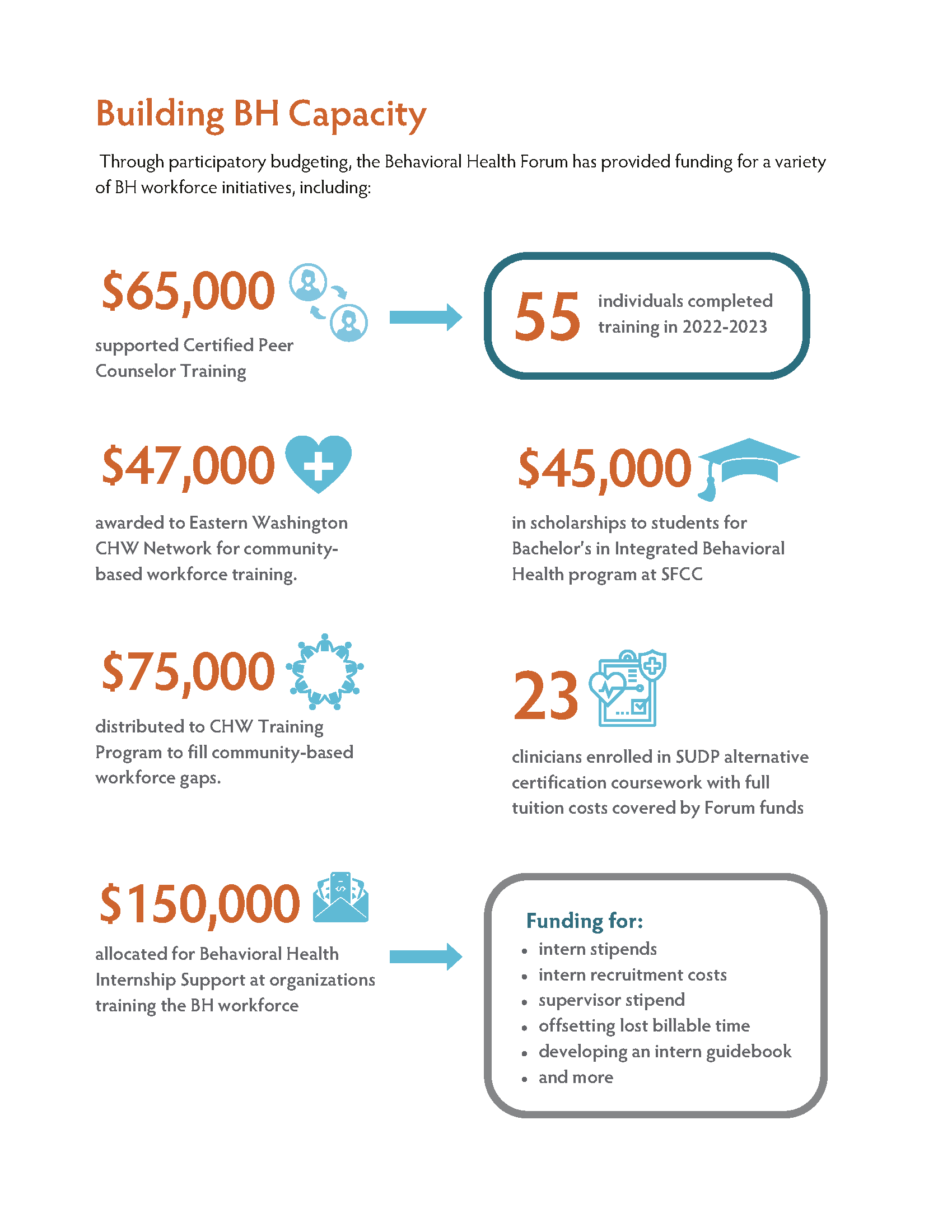Overview
Better Health Together’s Behavioral Health Forum, a convening body for behavioral health providers and educators in Eastern Washington, allocated funding in 2024 for multiple training opportunities to support the behavioral health and community-based workforce in Eastern Washington. Better Health Together has contracted with experts to present these trainings for free in 2024 and 2025.
Important note: Because of space limitations, Forum member organizations will receive prioritization and each organization may be limited in the number of slots allotted, dependent on interest. Directed by the Forum’s guiding principles, this helps us build an inclusive roster of training attendees and supports widespread participation.
Training Opportunities
-
This full-day workshop entitled Intergenerational Colonial Trauma: Long-Term Impacts on Native American Communities is presented by Indigenous-led consultancy Swan Innovations. It includes both knowledge acquisition and skill-building for behavioral health clinicians and other members of the workforce who are engaging with individuals impacted by trauma. Using an Indigenous Worldview as a framework and foundation, trainers Dr. Martina Welshula and Cree Welshula will educate participants about colonization, intergenerational trauma, and the neurobiology of culture and trauma. Participants will build skills and learn strategies to assist in providing culturally responsive care and support wellness and healing for the clients and community members they serve.
This program has been approved for 6.5 CEUs by the NASW Washington State Chapter. Licensed Social Workers, Marriage and Family Therapists, and Mental Health Counselors are eligible. Better Health Together’s Provider number is 1975-463.
Option #1: October 8, 2024 at Spokane Falls Community College
Option #2: November 12, 2024 at Spokane Falls Community College
Pre-register at this link: https://forms.office.com/r/CsvX6i90P8
-
Adult Mental Health First Aid
Adult Mental Health First Aid teaches people how to recognize signs of mental health or substance use challenges in adults ages 18 and older, how to offer and provide initial help, and how to guide a person toward appropriate care if necessary. Topics covered include anxiety, depression, psychosis, and addictions.
Date: August 9, 2024
Time: 8 am to 4 pm
Location: WSU Spokane Health and Research Building, 655 N. Riverpoint Blvd, Spokane, WAThis training is FULL. To be added to a waitlist or express interest in future Adult MHFA training, please email hannah@betterhealthtogether.org.
Youth Mental Health First Aid
Description: Youth Mental Health First Aid teaches you how to identify, understand, and respond to signs of mental health and substance use challenges among youth. After the course, you’ll be able to recognize common signs and symptoms of mental health challenges, recognize common signs and symptoms of substance use challenges, understand how to interact with a youth in crisis, and know how to connect a youth with help. This course is designed for adults who work with youth, including but not limited to: teachers, coaches, parents, camp counselors, school staff, etc.
Date: September 26, 2024
Time: 8 am to 4 pm
Location: Health Justice Recovery Alliance Wellness Center
Registration Link: https://ow.ly/vkhF50SRnWg -
Presented by the Institute for Individual and Organizational Change (IFIOC), this training series is for clinicians and members of the community-based workforce who want to build their skills in motivational interviewing. Pre-registration is open for the introductory course, with the opportunity to express interest in the advanced course and the coaching cohort. Twelve CEUs are available for behavioral health professionals with WA state licensure. We particularly encourage individuals interested in the entire series to register; this is an opportunity to achieve competency in fidelity-based motivational interviewing.
Pre-register at this link: https://forms.office.com/r/LPKNstA4MF
Introduction to Motivational Interviewing
-
Option 1: September 3 & 4 at Spokane Central Library
-
Option 2: October 16 & 17 at Northeast Community Center
Advanced Motivational Interviewing
-
November 14-15 at Northeast Community Center
Coding/Coaching Cohorts
-
This multi-session cohort for up to twelve people will support participants in obtaining full proficiency in fidelity-based motivational interviewing. Individuals will submit recordings to be coded using the MI Competency Assessment (MICA) tool and participate in coaching to improve their skills. Dates and times will be determined based on participant availability.
-
-
Better Health Together is partnering with Passages to offer a free two-day in-person (Spokane location) Wellness Recovery Action Plan training. WRAP training focuses on simple, effective tools and key recovery concepts that peers can use to create and maintain wellness.
This training is for Certified Peer Counselors in Eastern Washington.
-
Priority will be given to individuals from organizations that are part of the BHT Behavioral Health Forum, which is funding this free opportunity.
-
To ensure the training is available for many partner organizations, Better Health Together and Passages reserve the right to limit the number of participants per organization.
Training Dates
-
April 13-14, 2024
-
August 6-7, 2024. Pre-register at this link: https://forms.office.com/r/Fnux2vEHEN.
-
Q1 2025, Date TBD
-
Questions
Contact Hannah Klaassen, Better Health Together Program Manager: hannah@betterhealthtogether.org


